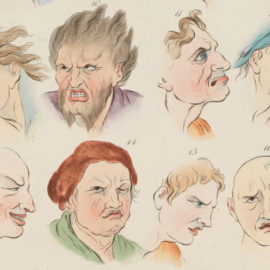

This article is an excerpt from the Shortform book guide to "Lost Connections" by Johann Hari. Shortform has the world's best summaries and analyses of books you should be reading.
Like this article? Sign up for a free trial here .
What are the most common causes of depression and anxiety? Why isn’t biology the main cause of depression?
The main causes of depression and anxiety are acute loneliness, childhood trauma, loss of purpose in life, and a severe disconnection with nature. There are biological factors that can make an individual vulnerable to depression, but these factors are usually latent. It is social, psychological, and environmental factors that can trigger a genetic tendency to have depression and anxiety.
Read on to learn more about the major causes of depression and anxiety.
What Are the Causes of Depression and Anxiety?
We’ve seen that biology isn’t the primary cause of depression for most people. In this part, we’ll cover the major causes of depression and anxiety: the social, psychological, and environmental factors in our daily lives.
Hari calls these factors “disconnections” because they represent a fundamental disconnect between the realities of modern life and the healthy practices we need in order to stave off depression. Disconnections fall into three broad categories: disconnections from others, disconnections from your past and future, and disconnections from a meaningful life.
We’ll start our examination of the causes of depression and anxiety by first exploring forms of disconnections to others: namely disconnection from meaningful relationships and from positive social status.
1. Disconnection From Meaningful Relationships
The first factor that can cause depression is disconnection from meaningful relationships with other people. Social isolation can create loneliness, which impacts us on more than just an emotional level: It creates real, measurable change in the body. In one study, researchers found that acute loneliness raises your levels of the stress hormone cortisol as much as being physically attacked.
(Loneliness also lowers your immune response. One study found that lonely people are three times more likely to catch the common cold than socially connected people; another study found that when people get sick with cancer or heart disease, lonely people are two to three times more likely to die from that illness than connected people are. These health effects will become an even bigger concern as technology starts to replace all types of in-person connections.)
The link between loneliness and depression is deceiving because it could reasonably go both ways: Loneliness could trigger the onset of depression, or being depressed could lead to social withdrawal and ultimately trigger loneliness. Researchers tested the direction of this effect using the power of hypnosis. They administered a battery of personality tests (including a test of depression symptoms) to participants and divided them into two groups. A psychiatrist who specializes in the clinical use of hypnosis then prompted one group to remember experiences of profound loneliness and the other group to remember feeling profoundly socially connected.
After coming out of hypnosis, the participants completed the personality tests a second time. The results were conclusive: People who remembered feeling lonely were significantly more depressed than they had been before undergoing hypnosis, and people who remembered feeling connected were significantly less depressed. In other words, this study showed that loneliness is a cause of depression, not just a result, because making people feel more lonely also made them feel more depressed.
2. Disconnection From Positive Social Status
Not all forms of in-person connections are helpful—if your social status is low or threatened, interaction with others can actually make depression worse. Surprisingly, the first researchers to study this effect weren’t psychologists or sociologists—they were primatologists studying the social hierarchies of baboons in Kenya. Monkeys and apes are humankind’s closest evolutionary cousins, and like us, they live in social communities. Studying those groups gives researchers a chance to watch social relationships play out in a much more concentrated way than they can when studying human communities.
3. Disconnection From Past Trauma
It may seem counterintuitive to deem disconnection from past trauma as one of the causes of depression and anxiety: If you’re not thinking about the terrible things that happened to you, shouldn’t you be happy? However, trauma affects us in powerful ways, many of which operate subconsciously—in other words, just because you’re not thinking or talking about the trauma doesn’t mean it’s not still impacting your life and contributing to depression, even decades later. Childhood trauma is one of the most reliable predictors of adult depression, and fully processing that trauma by facing it head-on is a powerful way to begin healing depression.
Scientists still don’t know exactly how childhood trauma causes adult depression, but Hari has his own theory based on the fact that people who experienced trauma as a child often irrationally blame themselves for what happened. He argues that this impulse starts out as a coping mechanism—when kids experience trauma, blaming themselves is a way of taking back control. In the short term, that sense of control is a relief—especially when the alternative is feeling totally powerless in a big, scary world—but in the long run, the false idea that the trauma was their fault and that they deserved what happened creates a deep emotional wound.
4. Disconnection From Hope for the Future
While disconnection from childhood trauma is a form of disconnection from the past, this section focuses on disconnection from the future: specifically, being unable to picture a hopeful future for yourself—or even any future at all.
You might assume that a lost sense of the future is just another symptom of depression—people get depressed, so they stop planning ahead because there doesn’t seem to be a point—but a lost sense of the future can also cause depression. Researchers confirmed this by studying indigenous First Nations groups in Canada. For generations, indigenous Canadians have suffered the same state-sanctioned abuses as Native Americans in the United States, including being forced off their ancestral land and into reservations. As a result, suicide rates were higher among First Nations people than any other group in Canada—but those suicides were clustered in only half of the 196 indigenous nations. The other half had zero suicides.
The reason for that stark difference had to do with control. Until recently, the Canadian government took over control of nearly every aspect of life in indigenous communities, including schools, elected officials, and even the local language. In the last few decades, some indigenous nations have successfully reclaimed control of some of their rights; others are still completely at the mercy of the federal government. That split in nations’ degree of control maps perfectly onto the suicide data: Nations with the most control of their own lives had the lowest suicide rates, while nations with the least control had the highest suicide rates.
Feeling in control of your life is so important to avoiding depression because when you don’t control your life, you can’t control your future; and when you have no way to influence the future, it’s hard to picture a happy one that feels remotely attainable. If your present reality is brutal and you can’t picture a hopeful future, depression is a pretty logical response.
For people outside First Nations communities, the loss of control that leads to no hope for the future and ultimately depression takes the form of unstable work, which is far less traumatic but can still have a powerful impact on mental health. The rise of the “gig economy” means that stable, guaranteed employment is no longer the norm. More people than ever are working for hourly wages with no contract and no guarantee that they’ll still have a job next week, let alone next year. This lack of job security is one of the primary causes of depression and anxiety in our modern society. Without that security, it becomes impossible to picture the future, and depression sets in.
5. Disconnection From a Rewarding Work Life
For many people, an unfulfilling and unhappy work life leads to depression. Most people sleepwalk through their work day or actively dread going to work, often because they feel they have little control over their responsibilities and thus disengage from their work. In 2011 and 2012, a Gallup poll surveyed millions of people all over the world. Only 13% said they are “enthusiastic about and committed to” their work. The rest were “not engaged” (63%) or “actively disengaged” (24%). At the same time, work hours are expanding—the “nine to five” is now more of a “seven to seven”—which means that many people spend more time working than doing things they actually enjoy.
It might seem obvious that spending most of your life in a job where you have little control and aren’t actively engaged could make you depressed, but scientists resisted recognizing unhappy work life as one of the causes of depression and anxiety for years. The tide began to change after a landmark study of British civil servants showed that the higher your status at work, the lower your risk of heart attacks and depression.
This finding contradicted the popular assumption that people at the top of the ladder would have more health problems because they made more important decisions and therefore had more stress. In fact, a second study of the British civil service showed that people who have more control over their work are far less likely to be depressed than people who have less control, even when they work in the same office and have the same salary. In other words, the degree of control you have over your job is a better predictor of depression than where you work, how much status you have, or even how much money you make.
This lack of control affects people even after they clock out. People who feel they have a sense of control over their work tend to feel more fulfilled at the end of a work day, so they have the energy to spend time with friends and family. On the other hand, people who have very little control over their work lives tend to be so drained by the end of a work day that they have no energy to invest in their relationships. Over time, that lack of investment creates disconnections with other people that only worsen depression.
Another control-related factor that determines how much work contributes to depression is the balance between effort and reward. In some jobs, the harder you work, the more money and status you gain; in others, your performance and dedication don’t matter, and the only time anyone even notices your work is if you do something wrong. If your efforts have a meaningful impact on your rewards, as in the former case, you have some degree of control over how rewarding your work is, and a lower risk of developing depression; but if your efforts go unnoticed and you have no control over your rewards, your risk for depression increases.
6. Disconnection From Intrinsic Motivation
How much you enjoy your work life also depends on whether you’re intrinsically or extrinsically motivated to do the work itself. Intrinsic motivation is what drives you to do things purely for the joy of them. If you love running and spend all your free time doing it, you’re acting on intrinsic motivation. On the other hand, extrinsic motivation is a means to an end: If you hate running but keep doing it because you’re trying to lose weight, that’s extrinsic motivation. You’re not doing it for the joy of the activity itself—you’re doing it for the payoff.
Today’s culture emphasizes extrinsic motivation because we base our definition of success on external milestones—like climbing the corporate ladder, getting married, buying a house, and so on. The logic is that meeting those milestones is the only way to be successful, and being successful is the only way to be happy. You may not love the actual day-to-day routine of your job, but you stick with it because it pays well, carries a fancy title, and makes it possible to buy that nice house. The job itself is just the means to achieve that goal.
Extrinsic motivation isn’t necessarily a bad thing—you’re probably not intrinsically motivated to go to the dentist for yearly checkups, but it’s still a good thing to do. But when the majority of your time is spent pursuing extrinsic motives, it’s a recipe for misery. Studies show that achieving intrinsic goals increases happiness, but achieving extrinsic goals doesn’t. Whether it’s a promotion, a bigger house, the newest gadgets—they might give you a fleeting burst of joy, but it wears off quickly, and doesn’t make you happier overall. In fact, over time, it does the opposite: Dozens of studies from all over the world show that the more extrinsically motivated you are, the more likely you are to develop depression and anxiety.
7. Disconnection From Nature
The final disconnection we’ll explore is a disconnection from nature. Humans evolved to live in the wild—in evolutionary terms, living inside buildings is a very new development. When we lose touch with the natural world, we often become caught up in our own problems and lose sight of the greater sense of meaning in our lives. We’re also more likely to become depressed: Rates of all forms of mental illness are higher in cities than in rural areas, and people in urban areas with more green space (like parks) have better mental health than people in urban areas without access to green space.

———End of Preview———
Like what you just read? Read the rest of the world's best book summary and analysis of Johann Hari's "Lost Connections" at Shortform .
Here's what you'll find in our full Lost Connections summary :
- The psychological and social factors that contribute to mental illness
- The history of antidepressants and the science behind them
- Why Amish people hardly ever get depressed






